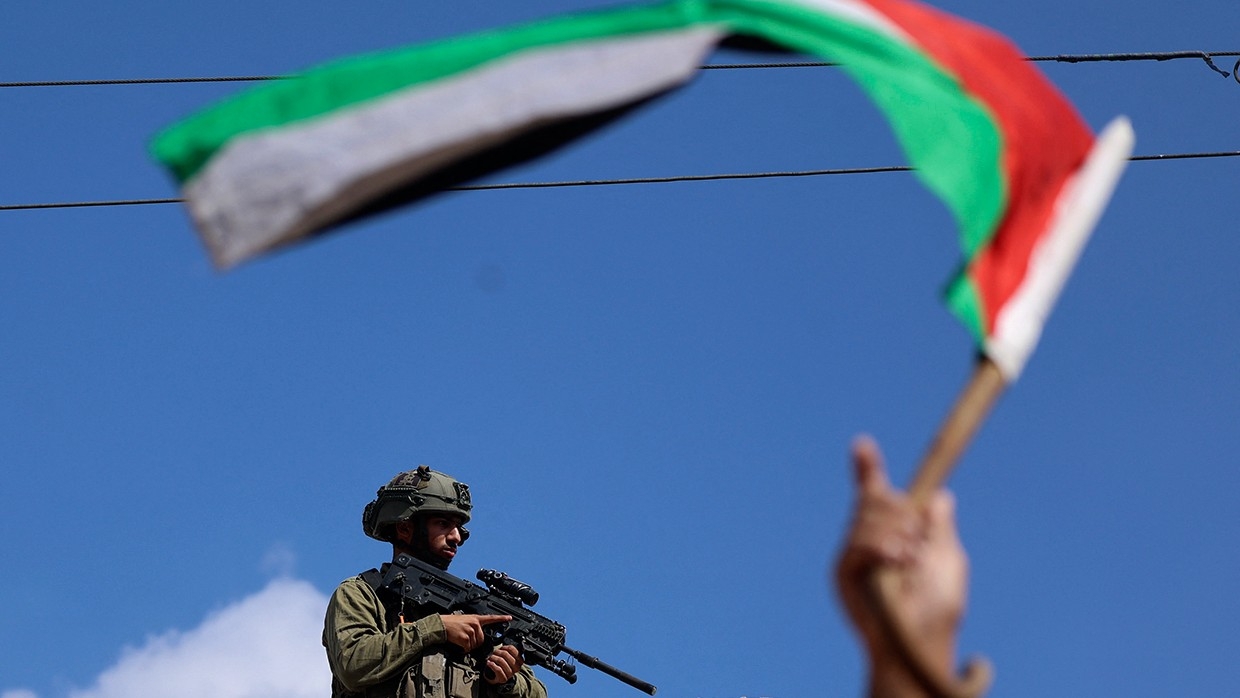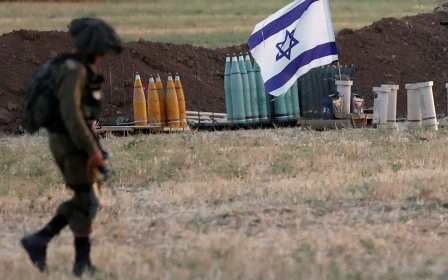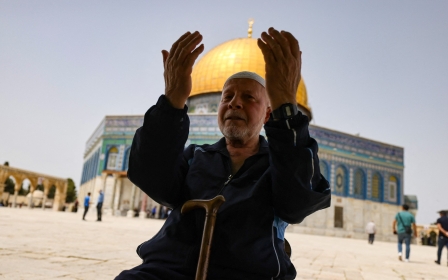New anti-colonial UN report gives Palestinians welcome boost in legitimacy wars

For more than a century, the Palestinian people have endured a series of ordeals that have violated their most basic individual and collective rights.
Instrumental to this epic saga of suffering has been the success of the Zionist movement in establishing the state of Israel on the premise of Jewish supremacy in 1948.
Such success depended also on perpetrating an international crime, as Zionists sought to establish not only a Jewish state but a democratically constituted state. This combination of goals could only be reliably reached and maintained by ensuring that Israel would have a permanent Jewish demographic majority.
Israel and its supporters have stopped responding to the substance of the carefully documented reports on alleged violations
This required a drastic demographic adjustment involving a large increase in the Jewish presence in Palestine - which was not feasible at the time - or the drastic reduction of the Arab presence.
New MEE newsletter: Jerusalem Dispatch
Sign up to get the latest insights and analysis on Israel-Palestine, alongside Turkey Unpacked and other MEE newsletters
A Jewish majority in Israel was further reinforced and safeguarded by a rigid denial of the right of return of displaced and dispossessed Arabs of Palestine in violation of international law.
Of course, this is not the whole story. There was a Jewish presence and biblical connection with Palestine stretching back thousands of years, although the Jewish minority had dwindled to less than 10 percent in 1917, when the British foreign secretary pledged support for establishing a Jewish homeland by way of the infamous Balfour Declaration.
More relevant was the rise of European antisemitism in the 1930s, culminating in the Holocaust, which made a Jewish sanctuary a condition of survival for a significant portion of Jews in the world.
Such historical context mobilised the Jewish diaspora, especially in the US, to back the Zionist project to colonise Palestine, and ever since, to provide geopolitical muscle and massive economic and military assistance to support the security and expansionist ambitions of Israel.
A UN innovation
At the international level, particularly within the UN, there has been constant sympathy and support for Palestinian rights under international law, especially in the General Assembly and the Human Rights Commission (HRC), which carries out the decisions of the Human Rights Council, consisting of 47 elected governments.
In 1993, a country mandate concerned with Israel’s human rights violations in the occupied Palestinian territories of East Jerusalem, the West Bank and Gaza was created.
It is from this that the mandate of the special rapporteur (SR) derives.
A special rapporteur is selected by a consensus vote of the HRC on the basis of a rather elaborate selection process that includes a committee of diplomats from member government that conveys to the president of the HRC a ranked shortlist of preferred candidates, supposedly selected because of their expert credentials.
The president generally follows the recommendation, which is then submitted to the HRC for an up or down vote, with a single dissenting vote sufficient to reject a candidate.
The SR position itself is a UN innovation, with each individual serving two three-year terms.
Although requiring considerable work by way of travel and reports, it is an unpaid position that is not subject to administrative discipline as a UN civil servant. This feature is designed to give the position complete political independence.
Israel and the US opposed the mandate since it was proposed, and in recent years Israel has refused to cooperate.
By denying entry into Israel or the occupied territories, the Israeli government denies the rapporteur direct contact with the people and situation on the ground, and forces a reliance on public information and meetings in neighbouring countries.
During the last 15 years, Israel and its supporters have stopped responding to the substance of the carefully documented reports on alleged violations, and concentrated their energies on allegations of UN antisemitism and related vilification of successive rapporteurs.
Despite this personally unpleasant pushback, the reports of SRs have gained influence and legitimacy among several governments, much of the media, and civil society actors including churches, labour unions, and human rights organisations.
Within this context, the new SR, an Italian academic jurist and highly regarded human rights expert, Francesca Albanese, has recently issued her first report, due shortly for presentation to the UN General Assembly in New York.
It is a notable document that comprehensively depicts and documents the most fundamental violations of the basic rights of the Palestinian people.
Against the flow of history
It appropriately gives primary attention to the inalienable right of self-determination, which provided the foundation for the anti-colonial struggles that shared with the Cold War the global centre stage in the three decades after the end of World War II.
Albanese notes the supreme irony that Zionism managed to go against the flow of history by establishing the settler-colonial state of Israel at the very moment when European colonialism was elsewhere collapsing.
Her report has gained immediate attention both for its spirit of fierce independence and the superior quality of its analysis. Such an exemplary performance has also provoked hostile commentary by way of taunts and defamatory allegations of a deliberately slanted presentation of evidence.
I would submit the opposite. Any objective reading of the Albanese report would conclude that the author goes out of her way to get access to Israel’s narrative and to present to the reader Israel’s standard defence of its behaviour.
Although accepting the emerging civil society agreement on Israel as practising apartheid, she sets forth a quite original argument for why the elimination of apartheid would not by itself be enough to end the ordeal of the Palestinian people.
Briefly summarising, most presentations of apartheid are territorially bounded either to the occupied territories or an enlarged entity that includes Israel proper (often known as stretching "from the river to the sea"), and thus excluding the refugees in the occupied territories and neighbouring countries, and involuntary exiles around the world living outside the boundaries of Palestine against their will.
Dismantling settler-colonial occupation
Beyond that, without satisfying Palestinian basic rights there is no assurance that Israel would not be able to maintain domination even after apartheid was dismantled.
For Albanese, it is indispensable to recognise that justice for the Palestinian people will not be done until their right of self-determination is fully implemented. She analyses this Palestinian right by reference to two principal dimensions: free choice of political governance format and permanent sovereignty over natural resources.
The resounding message of this historically significant report is its call for a solution premised on respect for history and international law
In essence, according to Albanese, the right to self-determination is the right of a people "to exist as independent both demographically (as a people) and territorially (within a given region) and to pursue their cultural, economic and social development through what the territory and associated resources offer."
In the more prescriptive sections of her report, Albanese puts her analytic skills to work in clearing a path forward for the Palestinians. She does not exempt the UN from its failures to uphold international law in relation to the struggles for justice and the rule of law in Palestine and is insistent that it should do better.
She indicts the UN as having "systematically failed to hold Israel accountable", thereby enabling Israel’s imposition of settler colonialism in the face of flagrant, repeated violation of international humanitarian law.
In passing, she also argues that Israel’s defiant rejection of a stream of General Assembly resolutions calling upon it to uphold Palestinian rights, including the rights of self-determination, "legitimated Palestinian right of resistance" and undermined the legality of Israel as an occupying power.
Ending apartheid not enough
The resounding message of this historically significant report is its call for a solution premised on "respect for history and international law", to be enacted by immediate withdrawal from the occupied Palestinian territories and the payment of reparations for decades of unlawful harm inflicted on the Palestinian people.
Albanese is to be commended for the clarity and forthrightness of this report to the UNGA, but it would be naive to suppose that it will by itself bring overdue liberation to the Palestinian people.
What it does bring is an authoritative legitimation of Palestinian resistance to occupation and a convincing critique of UN weakness when it comes to the implementation of basic rights.
The UN remains important in the symbolic domains of legitimacy wars, which have controlled the eventual political outcomes of major anti-colonial wars.
This contribution coincides with UN impotence to achieve substantive results whenever the dictates of justice clash - as here - with the vital strategic interests of a dominant geopolitical actor.
At the very least, this courageous report should serve as a wake-up call for the Global South and a reminder that the anti-colonial movement still faces a formidable challenge.
The views expressed in this article belong to the author and do not necessarily reflect the editorial policy of Middle East Eye.
Middle East Eye delivers independent and unrivalled coverage and analysis of the Middle East, North Africa and beyond. To learn more about republishing this content and the associated fees, please fill out this form. More about MEE can be found here.






